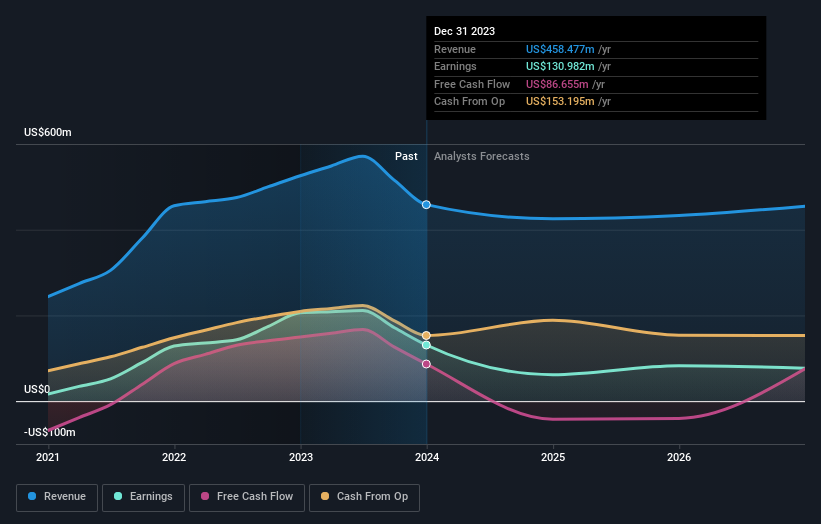Here's What Analysts Are Forecasting For Kenmare Resources plc (LON:KMR) After Its Yearly Results
Investors in Kenmare Resources plc (LON:KMR) had a good week, as its shares rose 7.5% to close at UK£3.22 following the release of its annual results. Results were roughly in line with estimates, with revenues of US$458m and statutory earnings per share of US$1.37. Earnings are an important time for investors, as they can track a company's performance, look at what the analysts are forecasting for next year, and see if there's been a change in sentiment towards the company. We thought readers would find it interesting to see the analysts latest (statutory) post-earnings forecasts for next year.
Check out our latest analysis for Kenmare Resources
Following the recent earnings report, the consensus from three analysts covering Kenmare Resources is for revenues of US$425.4m in 2024. This implies a discernible 7.2% decline in revenue compared to the last 12 months. Statutory earnings per share are expected to dive 51% to US$0.72 in the same period. Before this earnings report, the analysts had been forecasting revenues of US$431.1m and earnings per share (EPS) of US$0.80 in 2024. So there's definitely been a decline in sentiment after the latest results, noting the substantial drop in new EPS forecasts.
The consensus price target held steady at UK£5.87, with the analysts seemingly voting that their lower forecast earnings are not expected to lead to a lower stock price in the foreseeable future. Fixating on a single price target can be unwise though, since the consensus target is effectively the average of analyst price targets. As a result, some investors like to look at the range of estimates to see if there are any diverging opinions on the company's valuation. The most optimistic Kenmare Resources analyst has a price target of UK£8.46 per share, while the most pessimistic values it at UK£4.28. As you can see, analysts are not all in agreement on the stock's future, but the range of estimates is still reasonably narrow, which could suggest that the outcome is not totally unpredictable.
Taking a look at the bigger picture now, one of the ways we can understand these forecasts is to see how they compare to both past performance and industry growth estimates. These estimates imply that revenue is expected to slow, with a forecast annualised decline of 7.2% by the end of 2024. This indicates a significant reduction from annual growth of 19% over the last five years. Compare this with our data, which suggests that other companies in the same industry are, in aggregate, expected to see their revenue grow 1.0% per year. It's pretty clear that Kenmare Resources' revenues are expected to perform substantially worse than the wider industry.
The Bottom Line
The most important thing to take away is that the analysts downgraded their earnings per share estimates, showing that there has been a clear decline in sentiment following these results. Fortunately, the analysts also reconfirmed their revenue estimates, suggesting that it's tracking in line with expectations. Although our data does suggest that Kenmare Resources' revenue is expected to perform worse than the wider industry. There was no real change to the consensus price target, suggesting that the intrinsic value of the business has not undergone any major changes with the latest estimates.
With that in mind, we wouldn't be too quick to come to a conclusion on Kenmare Resources. Long-term earnings power is much more important than next year's profits. We have estimates - from multiple Kenmare Resources analysts - going out to 2026, and you can see them free on our platform here.
However, before you get too enthused, we've discovered 2 warning signs for Kenmare Resources (1 is potentially serious!) that you should be aware of.
Have feedback on this article? Concerned about the content? Get in touch with us directly. Alternatively, email editorial-team (at) simplywallst.com.
This article by Simply Wall St is general in nature. We provide commentary based on historical data and analyst forecasts only using an unbiased methodology and our articles are not intended to be financial advice. It does not constitute a recommendation to buy or sell any stock, and does not take account of your objectives, or your financial situation. We aim to bring you long-term focused analysis driven by fundamental data. Note that our analysis may not factor in the latest price-sensitive company announcements or qualitative material. Simply Wall St has no position in any stocks mentioned.

